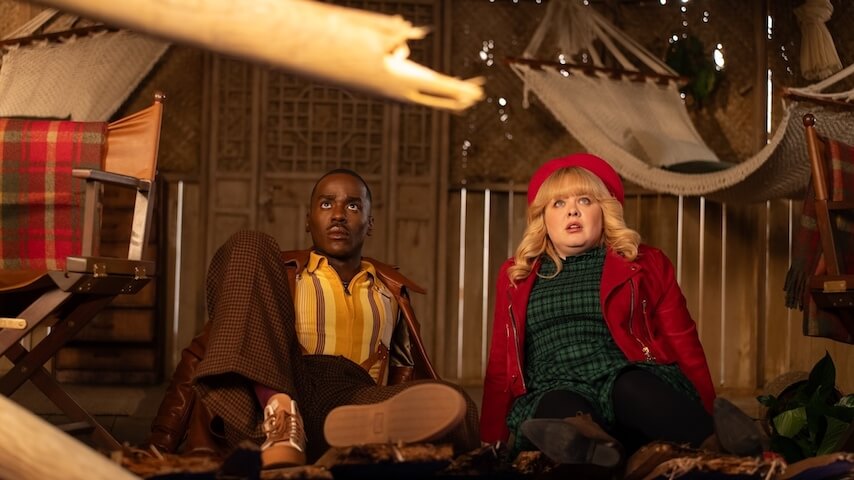Telling Clara to ‘take a punt’, The Doctor lands the TARDIS in a forest in medieval Nottingham where she hopes she can meet Robin Hood, despite The Doctor telling her that he is a complete myth. Upon arrival, Robin Hood appears and challenges The Doctor to a swordfight, which he engages with a spoon! As they meet the rest of the Merry Men, The Doctor grows suspicious that they are synthetic beings not historical entities. At an archery contest in which Robin splits the Sherriff of Nottingham’s arrow, The Doctor finally discovers the Knights guarding the Sherriff are disguised robots.
The Doctor, Clara and Robin are captured and imprisoned in the castle. While The Doctor and Robin argue over their escape plan, Clara is taken to the Sherriff where she manipulates him into admitting that he is helping robots from earth’s future repair their spaceship with gold. Robin and The Doctor discover the spaceship databanks before Robin and Clara escape. With the help of a golden arrow, the three reunite to destroy the spaceship before it leaves to destroy London. Clara tells Robin about The Doctor and Robin compares himself to the Timelord to explain how he can be real
What we have here is an inventive twist on the Doctor Who historical story. Instead of portraying history through myth and fiction, here we have The Doctor trying to prove that history is actually an artificial construction. Mark Gatiss’s script is as much a parody of Robin Hood movies and TV – particularly the tendency for the Merry Men to laugh at nothing – as it is a new take on the myth and, apart from the infantile slapstick of the spoon fight, it comes off superbly. Gatiss’ dialogue is typically silver-tongued but here it’s productive to the telling of the story.
What’s done particularly well in ‘Robot of Sherwood’ is the balance of playful and serious characterisations. The Doctor is lighter but no less aggressive. Tom Riley’s Robin is cheeky but also a credible hero. Ben Miller’s Sherriff of Nottingham is equal parts Tony Robinson and Alan Rickman, a comic villain but always a genuine threat. Gatiss manages to write Clara as strong without making her behaviour extreme (as in many Moffat’s episodes), especially in her scene with the Sherriff. Unfortunately, the Merry Men are severely underdeveloped and not enough is done with the set-up in Sherwood Forest for my liking.
The episode feels like a throwback to an earlier era of Doctor Who where the companion was always in the TARDIS and periods in earth’s history were visited regularly. It’s very much a one-off using Robin Hood to consider what the place of The Doctor might be in the popular culture of the future. As such, it doesn’t do much to develop the ongoing story but rather reflects on the historical significance of the programme. Danny is temporarily forgotten, there is less egregious reference to the ‘Promised Land’ story arc, and the episode could be anywhere in the season timeline.
More than the previous two episodes, ‘Robot of Sherwood’ demonstrates to us how much The Twelfth Doctor is going to be connected to the classic era of Doctor Who. There are numerous references to Jon Pertwee serials, with the re-introduction of Venusian karate and mention of the mini-scope from ‘Carnival of Monsters’. But Gatiss and Capaldi still distinguish this Doctor from his past incarnations. There’s an arrogance about this Doctor that borders on the anti-social, and it’s a shock to see him so routinely unpleasant to all around him. Clara is well-written, though she’s more of a generic companion here.
With Steven Moffat micro-managing the first couple of episodes of this season, it’s refreshing to get a different perspective on the character of the Doctor from Mark Gatiss, and this brasher, less complicated version seems far more workable in the long-term that the cold-hearted one seen in ‘Into the Dalek’. It’s an episode that cleverly interweaves nostalgia for the classic era of Doctor Who (and Robin Hood fiction) with intelligent commentary on myth and history. For the most part, the episode is well-balanced between comedy and drama, which is a blend that Doctor Who isn’t exactly known for getting right. That said, the 45-minute format does seem to be more of a restriction to Gatiss’s exploration of characters than other writers on the series. It doesn’t contribute much to the season arc but aptly demonstrates that the strengths of Doctor Who now lie in the standalone quality of individual stories.

